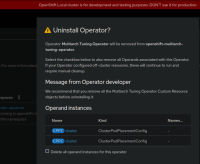-
Feature Request
-
Resolution: Unresolved
-
Undefined
-
None
-
None
-
None
-
None
-
Product / Portfolio Work
-
None
-
False
-
-
None
-
None
-
None
-
-
None
-
None
-
None
-
None
-
None
1. Proposed Title of the Feature Request:
Enable Annotation to enforce Operands Deletion before Operator Uninstallation in OpenShift Console
2. Nature and Description of the Request:
The OpenShift console currently includes the console.openshift.io/disable-operand-delete annotation, which can hide or disable the option to delete operand instances when uninstalling an operator.
In certain cases, operator developers strongly recommend or even require that users delete operand instances and Custom Resource (CR) objects before uninstalling an operator. However, in the absence of this annotation, the console presents a checkbox for operand deletion that is unchecked by default. This leaves the decision to the user, which can result in operands being unintentionally retained.
To address this, we propose the introduction of a new annotation that would enforce operand deletion during the operator uninstallation process. This annotation should prompt the console to display a clear message to the user, such as:
"Upon confirming the uninstallation of the operator, all associated operand instances will be deleted automatically."
This is NOT intended as a feature request for the Operator Lifecycle Manager, as it is out of its scope. Users can either follow the documented procedure (delete the operands and then the operator objects) or execute the uninstallation through the UI. The latter is the case considered by this RFE.
3. Justification for the Request:
Certain operators, including the multiarch-tuning-operator, recommend or mandate the deletion of Custom Resource objects (i.e., operand instances in the UI) before operator uninstallation. The current UI behavior, which defaults to not deleting operands, can lead to confusion or operational issues, potentially leaving unnecessary resources in the cluster. Implementing this feature would align the UI behavior with best practices recommended by the operator documentation and improve overall user experience by reducing the risk of unintended operand retention.
4. Affected Components:
OperatorHub components of the OpenShift Console
- impacts account
-
MULTIARCH-4251 Research about ordered uninstallation of the operator's resources
-
- Closed
-
